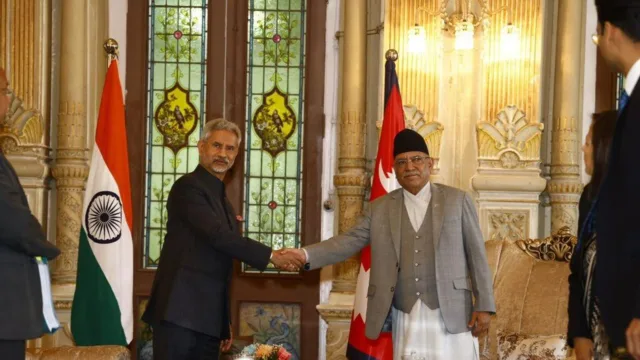In a significant development, India and Nepal took a step forward in bolstering their multifaceted bilateral relations with a series of agreements signed during a comprehensive and productive meeting between India’s External Affairs Minister, S. Jaishankar, and his Nepalese counterpart, NP Saud. The high-level talks, which marked Jaishankar’s first visit to a foreign country in 2024, were conducted in Kathmandu, and the leaders co-chaired the 7th India-Nepal Joint Commission meeting.
Key Agreements and Discussions:
- Overall Bilateral Ties:
– The discussions between Jaishankar and Saud covered a broad spectrum of issues, emphasizing the importance of overall bilateral ties. This encompassed trade and economic relations, underscoring the commitment to enhancing mutual cooperation for shared prosperity.
- Connectivity Projects:
– Infrastructure development and connectivity emerged as pivotal aspects of the dialogue. Both countries explored opportunities for collaboration on cross-border infrastructure projects and land, rail, and air connectivity to strengthen economic linkages.
- Defence and Security Cooperation:
– Matters related to defence and security were central to the talks, with both nations expressing a commitment to collaborative efforts to ensure regional stability. The discussions likely included border security and counter-terrorism measures.
- Cultural and People-to-People Exchanges:
– Recognizing the significance of cultural ties, the leaders discussed initiatives to promote people-to-people exchanges, tourism, and educational collaboration. Strengthening cultural bonds is integral to fostering enduring diplomatic relations.
- Environmental Cooperation:
– Environmental conservation and sustainable development were key components of the dialogue. With a shared ecological landscape, the leaders explored avenues for collaboration on climate change mitigation and other environmental issues.
- Pandemic Response and Health Cooperation:
– The ongoing global pandemic featured prominently in the discussions, highlighting the importance of international collaboration in healthcare. The leaders shared experiences and strategies to manage the impact of the pandemic on both nations.
- Historical and Bilateral Agreements:
– Revisiting historical agreements and diplomatic commitments, the leaders affirmed their dedication to ensuring the continued implementation of these agreements. This helps address any outstanding issues and reinforces the foundation of the bilateral relationship.
Inauguration and Agreements:
The leaders jointly inaugurated three cross-border transmission lines, symbolizing their commitment to enhancing connectivity. Additionally, both nations exchanged agreements on crucial areas, including the implementation of high-impact community development projects, long-term power trade, cooperation in renewable energy development, munal satellites, and the handover of the 5th tranche of post-Jajarkot earthquake relief supplies.
Strategic Importance:
Nepal holds significant strategic importance for India, given its geographical proximity and historical ties. The age-old “Roti Beti” relationship, as noted by leaders of both countries, further underscores the deep-rooted connections between the two nations.
Jaishankar’s visit included meetings with President Ramchandra Paudel and Prime Minister Pushpa Kamal Dahal ‘Prachanda,’ during which substantive views were exchanged on the unique and multifaceted Nepal-India relations.
In conclusion, the recent diplomatic engagements and agreements between India and Nepal reflect a commitment to fostering a comprehensive and robust bilateral relationship. The outcomes of these discussions are expected to have far-reaching implications for regional cooperation and stability, further solidifying the enduring ties between these neighbouring nations.









